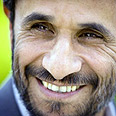
Six world powers agreed on Friday to push ahead with a third round of tougher sanctions against Iran unless reports later this month indicate Tehran has tried to address their concerns about its nuclear program.
Senior officials from Britain, France, Germany, the United States, Russia and China will meet again on November 19 to assess reports from Mohamed ElBaradei, head of the United Nations atomic watchdog, and from European Union foreign policy chief Javier Solana, a Foreign Office spokesman said.
"Political directors agreed to finalize a text for a third UN Security Council sanctions resolution with the intention of bringing it to a vote in the UN Security Council unless the November reports of Dr Solana and Dr ElBaradei show a positive outcome of the efforts," the spokesman said.
Iran has refused to halt uranium enrichment after two previous UN sanctions resolutions and denies it wants to make atomic bombs, saying its program is for power generation.
Britain said on Friday the top officials had asked Solana to seek a further meeting with Iran's chief nuclear negotiator and to report back.
US: Russia, China blocking moves against Iran
The United States imposed economic sanctions last week and has not ruled out military action against Iran. Britain has also been pushing hard for a third round of UN sanctions.
But diplomats from other countries have said they want to hear first how Iran's talks with the UN watchdog, the International Atomic Energy Agency (IAEA), are progressing after Tehran agreed to answer questions about past secret nuclear work.
Before the meeting, US Undersecretary of State for Political Affairs Nicholas Burns said Russia and China, major trading partners with Iran, had effectively blocked moves towards a third sanctions resolution for six months.
Russia believes dialogue rather than more punishment is the way forward while China reacted to the US sanctions by saying it was opposed to acting "too rashly."
But the group agreed on Friday to try to resolve the row through diplomatic means, the Foreign Office spokesman said.
"(The political directors) reiterated their commitment to negotiate a long-term solution to the Iranian nuclear issue and urged Iran to take up their offer of negotiation," he said.















